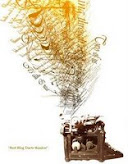No post yesterday because I was sick… again. I’m still feeling run down but it’s nothing like how I felt last night.
Anyway, on to fauvism (sounds like: foe-viz-um).
Fauvists used exaggerated colors when painting subjects. In fact, color was the most important aspect of a fauvist painting, with the subject taking a backseat. For example, when painting a portrait of a woman with very dark hair, a fauvist might choose to use blue in the hair to show just how dark it was. He might use yellow for the skin instead of a carefully mixed bronze. Shadows might be drawn in greens and purples instead of grey.
 Shown above is Andre Derain’s The Turning Road, L’Estaque. I love this painting for the way Derain has taken the colors of the changing fall leaves and used those colors throughout the painting, in the trees, the earth, and the people.
Shown above is Andre Derain’s The Turning Road, L’Estaque. I love this painting for the way Derain has taken the colors of the changing fall leaves and used those colors throughout the painting, in the trees, the earth, and the people.
Fauvism began in 1905, though artists were moving toward this color-based style of painting before this time. Fauvism in some ways grew out of the impressionism movement that van Gogh was a part of. Vincent van Gogh had a great influence on the fauvists. His use of color affected Henri Matisse (whose Woman with a Hat is shown below) and it affected Maurice de Vlaminck.
 Most people didn’t like this new movement. It was called fauvism by an art critic. Fauvism means “the wild beast” and it was not meant as a compliment. Some wealthy art buyers did purchase paintings, though, which allowed the artists to continue working.
Most people didn’t like this new movement. It was called fauvism by an art critic. Fauvism means “the wild beast” and it was not meant as a compliment. Some wealthy art buyers did purchase paintings, though, which allowed the artists to continue working.
By 1908 the movement had run its course and many of the artists involved moved on to other styles. Georges Braque, for instance, moved on to cubism. You can see this in the two paintings shown below, Spared from the Storm (1906) and Houses at L’Estaque (1908). Look at the change in style that happened in just two years!

 Return to main page.
Return to main page.
_____
Current NaNoEdMo Hour Count: 13.5/50hours
Anyway, on to fauvism (sounds like: foe-viz-um).
Fauvists used exaggerated colors when painting subjects. In fact, color was the most important aspect of a fauvist painting, with the subject taking a backseat. For example, when painting a portrait of a woman with very dark hair, a fauvist might choose to use blue in the hair to show just how dark it was. He might use yellow for the skin instead of a carefully mixed bronze. Shadows might be drawn in greens and purples instead of grey.
 Shown above is Andre Derain’s The Turning Road, L’Estaque. I love this painting for the way Derain has taken the colors of the changing fall leaves and used those colors throughout the painting, in the trees, the earth, and the people.
Shown above is Andre Derain’s The Turning Road, L’Estaque. I love this painting for the way Derain has taken the colors of the changing fall leaves and used those colors throughout the painting, in the trees, the earth, and the people.Fauvism began in 1905, though artists were moving toward this color-based style of painting before this time. Fauvism in some ways grew out of the impressionism movement that van Gogh was a part of. Vincent van Gogh had a great influence on the fauvists. His use of color affected Henri Matisse (whose Woman with a Hat is shown below) and it affected Maurice de Vlaminck.
 Most people didn’t like this new movement. It was called fauvism by an art critic. Fauvism means “the wild beast” and it was not meant as a compliment. Some wealthy art buyers did purchase paintings, though, which allowed the artists to continue working.
Most people didn’t like this new movement. It was called fauvism by an art critic. Fauvism means “the wild beast” and it was not meant as a compliment. Some wealthy art buyers did purchase paintings, though, which allowed the artists to continue working.By 1908 the movement had run its course and many of the artists involved moved on to other styles. Georges Braque, for instance, moved on to cubism. You can see this in the two paintings shown below, Spared from the Storm (1906) and Houses at L’Estaque (1908). Look at the change in style that happened in just two years!

 Return to main page.
Return to main page._____
Current NaNoEdMo Hour Count: 13.5/50hours








19 comments:
Hi Jessica. I just found your blog. I was referring to Matisse on my own blog and then saw yours. I hope you don't mind, but I added a link from my site to yours in the current post I am working on. Great site! I love that you are teaching this in such a clean and concise manner. Keep blogging.
Visited Nicole's blog! Really nice!
... and she is right about her positive comments here!!
Thanks to both of you! I have also visited Nicole's site and am looking forward to cooking...
And thanks, Nicole, for the link.
No problem Jessica. Glad to do it. I am new to blogging but really enjoying the community so far. Lots of fun and so many incredibly intelligent and talented individuals!
I read a book a little while ago that is purely fiction but parallels the life of Raphael. It is very interesting and a fun easy read. Not for the young kids but you may enjoy it or a high school age may as well. You can visit the books website at: http://www.thesidewalkartist.com/
Hi. I am doing fauvism in art and I just came across ur blog! thanks! its so hard to find someone who acctually puts this stuff into something 14 year olds can understand! LOL!
Thanks a Bunch.
- Jessica (hehe we've got the same name, love it!)
This is great! Thanks very muchh, it really helped me out with some art homework I have at the moment, it's very good because you wrote it in a way that a 12 year old can understand and I think it's really good :') xxx
Thanks, this helped a lot with my art homework.
hehe wow came across this saved my art homework!!!
Hi
How would you Describe fauvism in terms of:
Line
Shape
Colour
Ok, this is so not helpful, and I know 14 yr olds who would understand stuff harder than this -_- just saying, do not get angry.
yup its good. Thnk it helped out my fauvist project too.
Cool!
thanx soooo much this has helped me so much i'll get top marks in art xx
Ths really helped, thanks so much! I will get top marks in art for this!!
thankyou i was really struggling with this topic in art (i am only in year 7) and i needed some help with homework theanks againxxxxxxxxx
Thanks! Helped soooooo much with my art hmk!xxx ;X
heyxxxx ur blog is amazing! all the other sites just babble and i cant understand a word they say!
thnx soooooooo much :)
i got an A for my hmk on fauvism!!!!!!!!!!!!!!!!!!!!!!!!!!!
heyxxxx I luv this site soooo much. all the other sites just babble and i dont understand a thing!!!!! i got an A in my fauvist hmk thnx to u!!!! :)
helping me with homework and easy to understand.cheers
Post a Comment